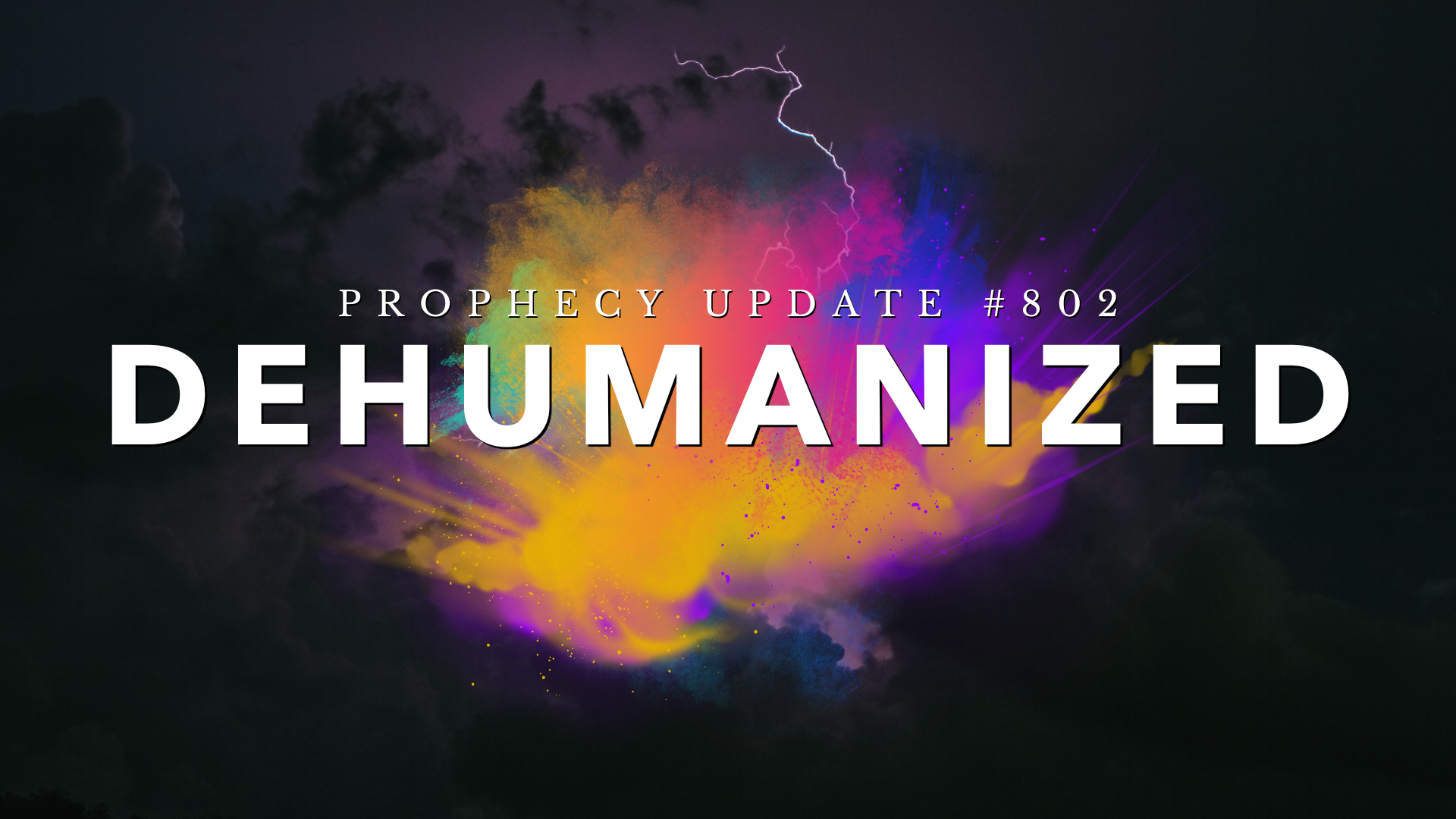
Inka Dinka Do You Have His Mark On You? (Ezekiel 9:1-11)
The Nazi’s tattooed the Jews held captive in Auschwitz for purposes of administration.
Combinations of numbers & letters communicated information about their time of arrival to the camp or transfers from another camp.
Holocaust survivors often speak of how the tattoo symbolized their loss of humanity and individuality during their time in the camps.
It wasn’t the first time in their history that Jews were ‘marked.’
In the sixth century BC a man with an inkhorn was sent throughout Jerusalem assigned to ‘mark’ Jews. But unlike the Holocaust, it was an exceedingly good thing to be marked. You wanted to be marked.
Those with the mark on their foreheads were the remnant of righteous Jews. They would be spared from being slain when the Babylonians came the third & final time to loot & level Jerusalem and the Temple.
The remnant to be supernaturally marked was marked by their “sigh[ing] and cry[ing]” over the abominations that were done within” the Temple.
There doesn’t seem to be any direct corollary to make between the Jews being marked and Church Age believers being marked. We can, however, always contemplate versions of the question, “What is the mark of a believer?”
Let’s do that! I’ll organize my comments around two questions: #1 What Marks You In Public?, and #2 What Marks You In Private?
#1 – What Marks You In Public? (v1-8)
What is the mark of a Christian?
It’s not one thing, but there is one thing that Jesus said was fundamental. He said, “A new commandment I give to you, that you love one another; as I have loved you, that you also love one another. By this all will know that you are My disciples, if you have love for one another” (John 13:34-35).
The love Jesus spoke of would be observable.
Francis Schaeffer, in a small book appropriately titled, The Mark of a Christian, concludes, “The world has a right to look upon us as true Christians, and it should be able to observe that we do love each other. Our love must have a form that the world may observe; it must be seeable.”
You may not get around to reading Schaeffer, so let me tell you how he says you exercise observable love. “It means a very simple thing: It means that when I have made a mistake and when I have failed to love my Christian brother, I go to him and say, ‘I’m sorry.’ That is first. It may seem a letdown – that the first thing we speak of should be so simple! But if you think it is easy, you have never tried to practice it.”
Oswald Chambers wrote, “Forgiveness is the divine miracle of grace; it cost God the Cross of Jesus Christ before He could forgive sin and remain a holy God… When once you realize all that it cost God to forgive you, you will be held as in a vice, constrained by the love of God.”
Among the things that are noteworthy about the marking in our Ezekiel passage is that it is based on observable public behavior. God knows the hearts of all men. You’d think He would have given the man with the inkhorn a list of names. No, he was tasked with observing their outward behavior.
Ezk 9:1 Then He called out in my hearing with a loud voice, saying, “Let those who have charge over the city draw near, each with a deadly weapon in his hand.”
Ezk 9:2 And suddenly six men came from the direction of the upper gate, which faces north, each with his battle-ax in his hand. One man among them was clothed with linen and had a writer’s inkhorn at his side. They went in and stood beside the bronze altar.
He called for “six men,” who by their description and duties we understand to be supernatural, likely angels. They were the original Seal Team Six.
They are said to “have charge over the city.” Every now and then we get a glimpse of the supernatural:
- In the Book of Daniel we see that the angel Gabriel was detained by a mighty supernatural, called the Prince of Persia, until Michael the archangel came along to relieve him.
- Elijah asks God to open the eyes of his servant to see the heavenly armies surrounding and protecting them.
- Here in Ezekiel we see that six mighty angels had charge over Jerusalem.
Reading about these things some believers have concluded that there are territorial spirits and that we must identify them and go to spiritual battle against them.
That’s a huge unscriptural leap into weirdness.
Angels fight angels but we do not. If you want to do battle, you’re told how in the Revelation. We read of God’s saints, “they overcame [the devil] by the blood of the lamb and the word of their testimony, they loved not their lives unto death.”
The angels who had charge over Jerusalem were reassigned to carry out judgment against the Jews. They chose from their armory “battle-axes.” They go through the Temple and the city slaughtering Jews.
About 200yrs before Ezekiel Jerusalem was besieged by the Assyrian army. One night as they slept, the Angel of the Lord went through their camp killing. In the morning, 185,000 Assyrian soldiers were dead.
In our passage, they donʼt personally slaughter Jews. The Babylonian army will slaughter the Jews when the siege ends and they breech the walls. Ezekiel’s vision is a representation in Heaven of the LORD’s providential actions on Earth. This is what the overthrow of Jerusalem looks like in heavenly terms.
Ezk 9:3 Now the glory of the God of Israel had gone up from the cherub, where it had been, to the threshold of the Temple…
The Temple was Solomon’s Temple – and it was magnificent. Its most amazing feature was Shekinah. That is what we call the radiant cloud that resided in the Holy of Holies of the Temple, on the Mercy Seat flanked by carved images of Cherubim. God was thereby among them.
Soon they would say, “God has left the building.”
Ezk 9:3 … And He called to the man clothed with linen, who had the writer’s inkhorn at his side;
Ezk 9:4 and the LORD said to him, “Go through the midst of the city, through the midst of Jerusalem, and put a mark on the foreheads of the men who sigh and cry over all the abominations that are done within it.”
If you’ve had something notarized, the notary has a ledger and a pen and an ink pad for fingerprinting.
The full title of a Notary is Notary Public. This supernatural was one of, or maybe the only, Notary in Heaven. His work on this occasion was to notarize the public behavior of the Jews who sighed & cried.
Ezk 9:5 To the others He said in my hearing, “Go after him through the city and kill; do not let your eye spare, nor have any pity.
Ezk 9:6 Utterly slay old and young men, maidens and little children and women; but do not come near anyone on whom is the mark; and begin at My sanctuary.” So they began with the elders who were before the Temple.
We don’t need to act as if the wholesale slaughter of people, including women and kids, doesn’t trouble us. It should greatly trouble us.
Two things to consider:
- Jeremiah distinctly said, “Thus says the LORD: ‘He who remains in this city shall die by the sword, by famine, and by pestilence; but he who goes over to the Chaldeans shall live; his life shall be as a prize to him, and he shall live. This city shall surely be given into the hand of the king of Babylon’s army, which shall take it.’ ” No one need die. No women or children. They chose to allow their children to die.
- These episodes serve as reminders that the God of the Bible is infinitely holy while we, by our own choice, are sinful. We chose sin and death. Apart from Jesus, all of mankind is conceived in sin and death. God acted immediately to save us, enacting an ambitious plan that involves Him suffering on our behalf.
It isn’t remarkable that sinners would be slaughtered, but rather that God has made a way for us to be reconciled to Him, and the majority reject it, choosing death.
- My first thought about tragedy shouldn’t be, “How could God allow this?”
- My first thought ought to be, “Thank you, Lord, that you’ve made a way out of this and into bliss!”
Ezk 9:7 Then He said to them, “Defile the Temple, and fill the courts with the slain. Go out!” And they went out and killed in the city.
Nothing defiled a Jew more than contact with a dead body. This vision of the Holy of Holies, the Holy Place, and the courts of the Temple would horrify even the most backslidden Jew.
The Jerusalem Jews thought it inconceivable the the LORD would allow His beloved city and its Temple to be destroyed. They were wrong.
Do you have any inconceivables? It’s not a fair question because often you don’t know that you have an inconceivable until the inconceivable happens.
The question we must each ask of ourself is some variation of, “Are the things that ‘mark’ my public life consistent with how a Christian ought to be living in the Church Age?”
Should we be sighing and crying? Not necessarily. That was the mark of a believer in the sixth century BC. We live in a very different dispensation.
The apostle Peter encouraged us to behave according to our times. He said, “What manner of persons ought you to be in holy conduct and godliness, looking for and hastening the coming of the day of God… according to His promise, look for new heavens and a new Earth in which righteousness dwells… looking forward to these things, be diligent to be found by Him in peace, without spot and blameless” (Second Peter 3:11-14).
Schaeffer wrote, “The world is going to judge whether Jesus has been sent by the Father on the basis of something that is open to observation.”
A major observable mark is “holiness,” separation from the world. Not a withdrawal from the world, but keeping ourselves from being overwhelmed by it.
#2 – What Marks You In Private? (v8-11)
With the supernaturals off on their marking ministry, Ezekiel finds himself alone with the LORD. What was the prophet like in private? What ‘marked’ him?
Ezk 9:8 So it was, that while they were killing them, I was left alone; and I fell on my face and cried out, and said, “Ah, Lord GOD! Will You destroy all the remnant of Israel in pouring out Your fury on Jerusalem?”
Ezekiel only prays for the remnant. He understood that the time for the majority of Jews to repent was passed.
If a remnant did not survive, all of God’s plans would fall like a house of cards. The promised Messiah of Israel and Savior of the world would be God come in human flesh. The human flesh that He would come into was Jewish. Israel would produce the Messiah, the Savior. Ezekiel knew this, at least in part, and was worried that things were getting awfully precarious.
Where have we heard something similar to his prayer before? When God came with two angels who would go on to destroy wicked Sodom & Gomorrah, Abraham pleaded with God to not destroy the cities if ten righteous could be found there. He negotiated with the LORD, somewhat successfully in that Abraham’s nephew, Lot, and his family were removed from the cities before they were burned.
Ezekiel was conducting a negotiation, or trying to. He would be altogether unsuccessful. We would put this in the bin marked, Prayers God said “No” to.
All of us have uttered prayers that we are glad God did not answer. Nevertheless, we still find it difficult that He is saying “No” to what we are asking for today.
Ezk 9:9 Then He said to me, “The iniquity of the house of Israel and Judah is exceedingly great, and the land is full of bloodshed, and the city full of perversity; for they say, ‘The LORD has forsaken the land, and the LORD does not see!’
Following King Solomon’s death, Israel split into two countries: Israel & ten tribes to the north, Judah & two tribes to the south. The LORD sees both “houses” back as one nation.
Ezk 9:10 And as for Me also, My eye will neither spare, nor will I have pity, but I will recompense their deeds on their own head.”
The LORD must punish sin. He would not be God if He were not holy, holy, holy. There could be no Heaven. No salvation.
He took upon Himself human flesh so He could die as the final sacrifice for sin, in our place. He substituted Himself for us. The result of Him being lifted up on the Cross at Calvary is that He has the power to draw all men to Himself. He is the Savior of the whole world – especially of those who believe.
Ezk 9:11 Just then, the man clothed with linen, who had the inkhorn at his side, reported back and said, “I have done as You commanded me.”
Mission accomplished – Remnant safe & sound.
Jews will be marked again. In the Revelation we are introduced to 144,000 Jews, 12,000 from each from the 12 tribes. They are “sealed” on their “foreheads.” As a result, they cannot be harmed during the Great Tribulation.
I want to mention one other thing that marks a believer in the Church Age. The apostle Paul writes, “I bear in my body the marks of the Lord Jesus” (Galatians 6:17).
Jesus had specific marks in His body, e.g., the wound in His side where the Roman soldier pierced Him on the Cross. Paul was beaten numerous times. He mentions receiving “forty lashes minus one” from the Jews on five occasions and being beaten with rods three times (Second Corinthians 11:24-25).
Francis Schaeffer said to start with forgiveness. Is there someone who’s forgiveness you need to ask? Are you unforgiving of anyone? As long as unforgiveness persists, believers and unbelievers will not observe the Lord in your life.
Who are you in private? Let the Lord show you what He observes in you. Repent as necessary.
Always bear this in mind: After grief for sin there should be joy for forgiveness.







